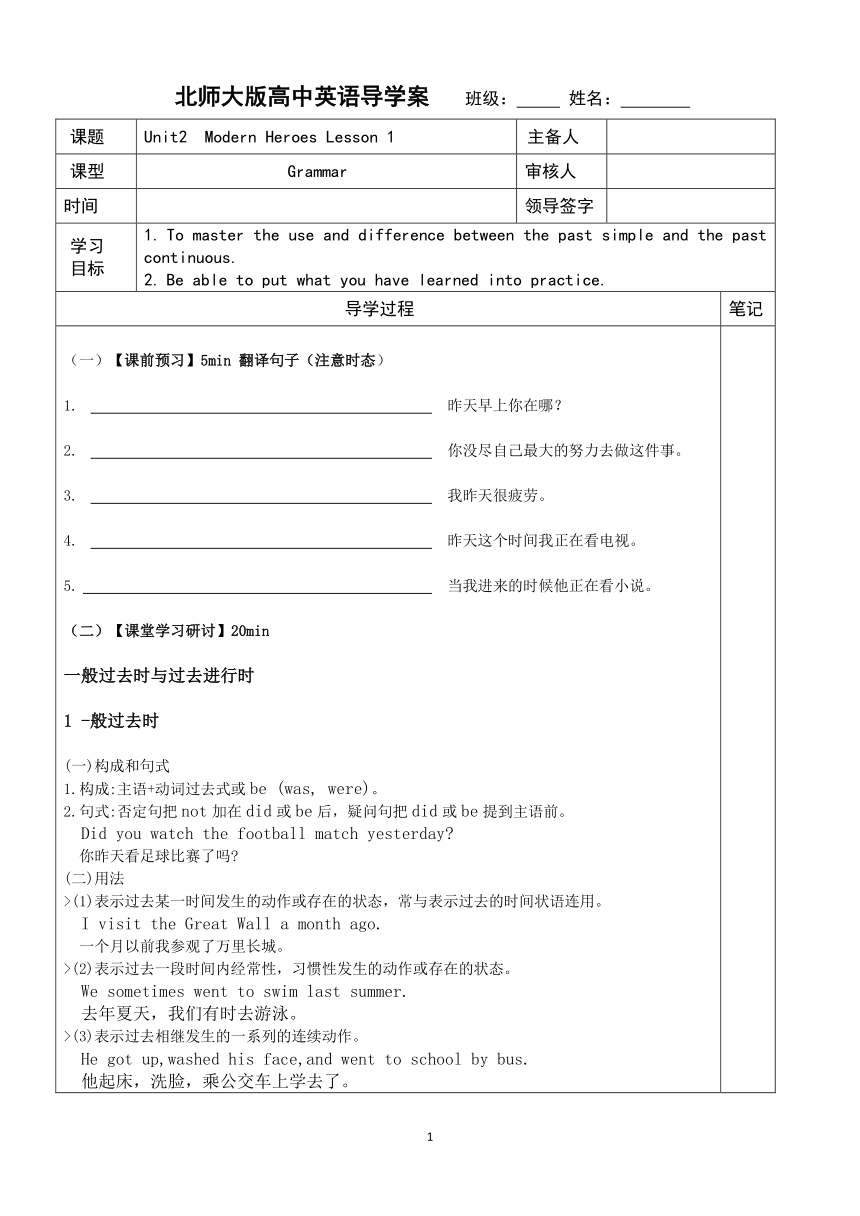
北师大版高中英语导学案 班级: 姓名: 课题 Unit2 Modern Heroes Lesson 1 主备人 课型 Grammar 审核人 时间 领导签字 学习 目标 To master the use and difference between the past simple and the past continuous. Be able to put what you have learned into practice. 导学过程 笔记 【课前预习】5min 翻译句子(注意时态) 昨天早上你在哪? 你没尽自己最大的努力去做这件事。 我昨天很疲劳。 昨天这个时间我正在看电视。 当我进来的时候他正在看小说。 【课堂学习研讨】20min 一般过去时与过去进行时 1 -般过去时 (一)构成和句式 1.构成:主语+动词过去式或be (was, were)。 2.句式:否定句把not加在did或be后,疑问句把did或be提到主语前。 Did you watch the football match yesterday? 你昨天看足球比赛了吗? (二)用法 >(1)表示过去某一时间发生的动作或存在的状态,常与表示过去的时间状语连用。 I visit the Great Wall a month ago. 一个月以前我参观了万里长城。 >(2)表示过去一段时间内经常性,习惯性发生的动作或存在的状态。 We sometimes went to swim last summer. 去年夏天,我们有时去游泳。 >(3)表示过去相继发生的一系列的连续动作。 He got up,washed his face,and went to school by bus. 他起床,洗脸,乘公交车上学去了。 >(4)有些情况发生的时间没清楚地表明,但实际上是过去发生的,应使用一般过去时。 The fire broke out during the night. 大火发生在夜间。 >(5)追忆逝去的人或事,常用一般过去时。 Lei Feng set a good example to the people throughout the world. 當锋为全世界的人们树立了一个好榜祥. >(6)在虚拟语句中表示现在或将来的情况,常和would,could等连用。 If I had time,I would go and visit you. 如果我有时间会去看望你的。 >(7)在时间和条件状语从句中,常用一般过去时代替过去将来时。 Mavis said she would come if l promised to wait for her. 梅维丝说如果我答应等地,地会来的。 [误区警示] 这一点要联系在含有时间或条件状语从句的主从复合句中“主将从现”的用法,即当主初为一般将来时时,从句往在用一般现在时代替一般将来时。 填空 1.He (graduate) from MIT a year ago. 2.It (get) as cold as minus 15 degrees those days. 3 .He ( drop) the coffee cup and broke it. 4.Surprisingly , Susan's beautiful hair ( reach ) below her knees and made itself almost an overcoat for her. 5.Walt Disney (design) many cartoon characters, such as MickeyMouse. 6. He told me he would buy a portable computer as soon as he (graduate). 7. Last week Class One (challenge)us to a basketball match. 8.She said she would become a volunteer teacher if she (have) a chance. 2过去进行时 (一)构成和句式 1.构成:be (was, were) + doing。 2.句式:否定句把not加在be后,疑问句把be提到主语前。 He was not reading a novel when I came in. 我进来时他没有在读小说。 (二)用法 > (1)表示过去某-时刻正在进行的动作。常与表示过去的时间状语从句以及at that time,at that moment, at this time yesterday, ten o'clock yesterday等时间状语连用。 We were discussing the plan the whole morning yesterday. 昨天整个上午我们一直在讨论这个计划。 > (2)表示过去某段时间内一直在进行的动作,但说话时不一定正在进行。 He was writing a book last year,but I don't know if he has finished it.他去年在写一本书,但我不知他是否已经完成。 > (3)表示按照计划、安排过去将要发生的情况。可以这样用的动调(短语)有come, go, plan,expect, look fo ... ...
~~ 您好,已阅读到文档的结尾了 ~~